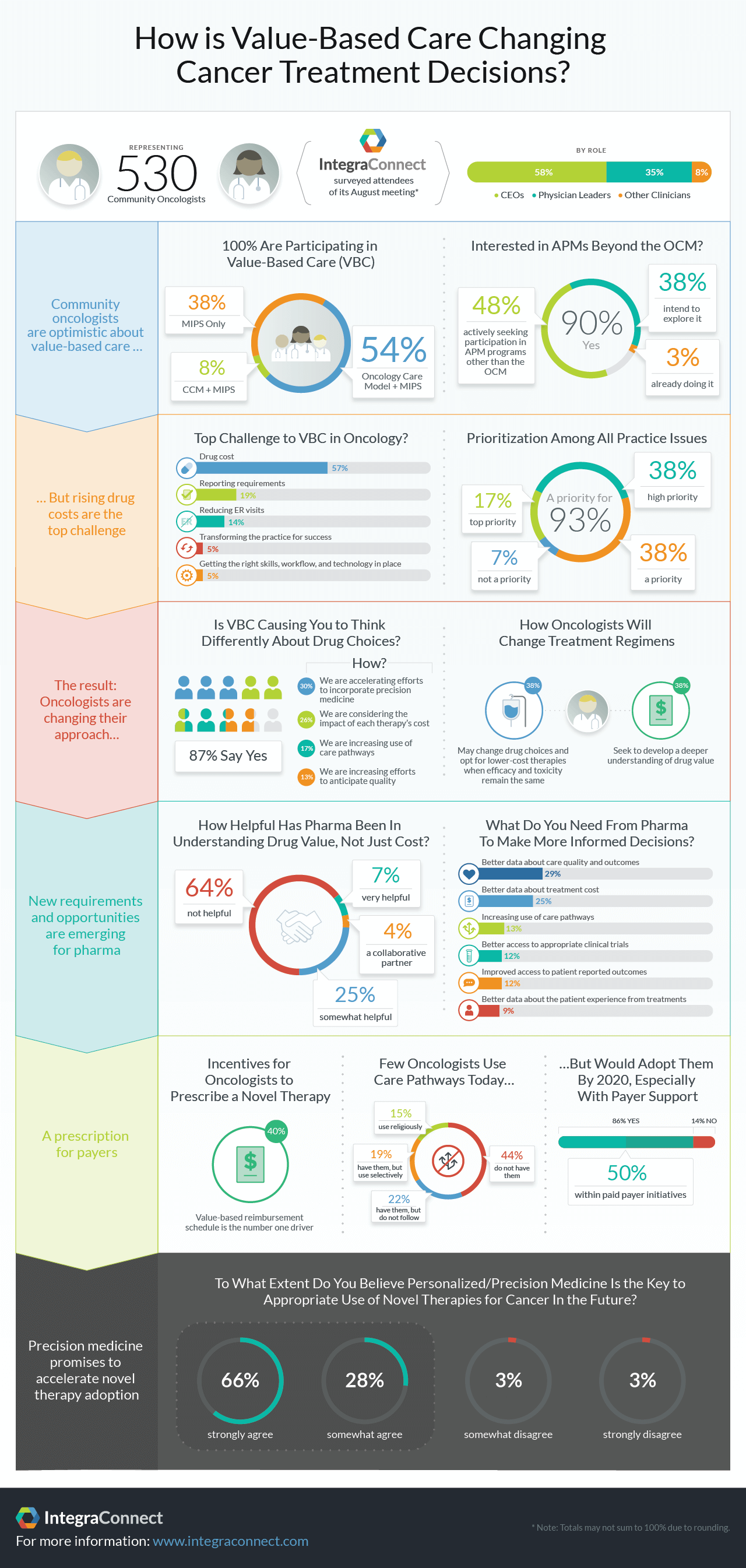Mar 20
2019
Impact of Value-Based Care On How Community Oncologists Think About Treatment Choices
New data on the state of value-based care in oncology has found that while community oncologists are optimistic about the beneficial potential of value-based care, they see a conflict between the need to decrease episode costs and the rising prices of the most innovative novel therapies.
In an effort to dig deeper into current attitudes toward new value-based reimbursement models and novel therapies in cancer care, Integra Connect surveyed leaders and decision-makers in oncology practices. Respondents represented practices with approximately 530 community oncologists, all of whom are participating in value-based care programs.
The survey results yield useful insights into how oncologists are dealing with rising drug costs in the era of value-based care, which makes practices financially accountable for improving the quality of patient care while also lowering the overall costs of cancer episodes. As drug prices continue to increase to new levels, driven in part by groundbreaking therapies, respondents indicated that it is becoming increasingly difficult to keep costs below value-based care program targets.
Other key themes surfaced by the survey include: expectations for the future of value-based cancer care; how drug costs are affecting treatment behaviors; what oncologists need from pharmaceutical manufacturers; the influence and effect of care pathways; and the value of and vision for precision medicine.
The number one challenge for making value-based care work: Rising drug costs
When asked about the number one challenge for making value-based care succeed in oncology, the majority of respondents (57 percent) cited managing the rising cost of drugs, including promising but expensive novel therapies. Beyond the context of value-based care, 93 percent of oncologists describe increasing drug costs as a priority issue impacting the overall well-being of their practices.
Value-based care is driving changes in cancer treatment choices
With oncologists increasingly accountable for the cost of entire episodes of care, a full 87 percent of survey respondents said that value-based care is causing them to think differently about drug choices, compared to their approaches during the fee-for-service era. When it comes to the choice of drug for an individual patient’s treatment regimen, oncologists assert that they remain as committed as ever to delivering the best clinical outcomes, regardless of impact on episode cost.
Nonetheless, more than three-quarters of oncologists indicated that they are making changes to how they and their practices choose treatment regimens under value-based care programs. A sizeable group (38 percent) says that it may change drug choices and opt for lower-cost therapies, but only when efficacy and toxicity remain the same. An equal percentage of oncologists voiced a desire to develop a deeper understanding of drug value, not just cost, that helps them understand the patient impact of therapies on an individualized level.
New opportunity for pharma and payers: As a value-based care partner to oncologists
To ensure oncologists are empowered to match the right treatments with the right patients in the era of value-based care, a new level of cooperation is required among providers, pharma and payers. However, oncologists say they need help when it comes to figuring out how to optimize treatment decisions for the new landscape. When asked how helpful pharma companies have been in understanding the holistic value, and not just the cost, of their therapies:
- Almost two-thirds (64 percent) indicated that pharma has “not been helpful at all”
- One-quarter describe pharma as “somewhat helpful” but only providing data when requested
Oncologists have specific ideas about what they need from pharma manufacturers and payers to make more informed decisions about treatments and novel therapies under value-based care:
- Over half of oncologists believe receiving better data from pharma about treatment costs (25 percent), and care quality and outcomes (29 percent) will help them make more informed decisions about treatments and novel therapies
- Regarding payers, 40 percent stated the existence of a value-based reimbursement schedule is the number one driver that would incentivize oncologists to prescribe a novel therapy
Respondents also expressed interest and obstacles related to accessing and implementing effective care pathways:
- Two-thirds of oncologists are not using care pathways because they either lack access to them (44 percent) or have them but don’t follow them (22 percent)
- However, 86 percent see a role for care pathways in their practice in some form by 2020
- Respondents saw the key to active use of care pathways as integrating them into value-based reimbursement models, with half of those surveyed predicting that within two years they are likely to develop or purchase care pathways to use within paid payer initiatives.
Realizing the vision of precision medicine
Regardless of the near-term impact of value-based care, oncologists are nearly unanimous in their belief that the advance of precision medicine will ultimately resolve the growing tension between drug cost and value. When asked “to what extent do you agree that personalized/precision medicine is the key to appropriate use of novel therapies for cancer in the future?” a full 94 percent of oncologists express agreement – two-thirds of them strongly.
“With clinical outcomes rightly considered non-negotiable, this data shows that community oncology is seeking new frameworks for understanding the comprehensive value of novel therapies and other high-cost treatments,” said Dr. Jeffrey Scott, chief medical officer of Integra Connect. “It is not an effort they believe that they can – or want to – undertake alone. While oncologists say pharma is not at the table today, they’re expressing the need for new data and insights that only manufacturers can provide. In addition, they foresee the need for closer payer cooperation in order for future generations of value-based reimbursement models to be successful.”
To access an accompanying infographic that further details t he survey findings – click here.
